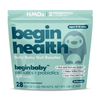Formula-Fed? Here’s How to Get More of Breast Milk’s Nutritional Benefits
share this article

Breast milk is the gold standard for infant nutrition but not every parent can, or chooses to, breastfeed. Whether by choice, necessity, or circumstance, formula-fed babies can still thrive, especially with thoughtful nutrition support.
If you're using infant formula, there are safe, evidence-based ways to help your baby get more of the immune, gut, and developmental benefits associated with breast milk.
Here’s how to thoughtfully bridge the gap using modern nutritional tools that mimic breast milk’s most important features.
1. Choose a Formula with HMOs (Human Milk Oligosaccharides)
One of breast milk’s most powerful components is a group of prebiotics called Human Milk Oligosaccharides (HMOs). These naturally feed good gut bacteria, support immune development, and protect against harmful pathogens. Over 200 types of HMOs exist in breast milk with 2'-fucosyllactose (2’-FL) being the most common.
Today, many formulas include 2’-FL, and in some cases additional HMOs, to help mimic these benefits. Studies show that babies fed HMO-supplemented formula have:
-
A gut microbiome more similar to breastfed infants
-
Fewer respiratory and gastrointestinal infections
-
Better support for immune and digestive development [1]
If your baby’s formula doesn’t contain HMOs, ask your pediatrician about adding a supplement like Beginbaby Prebiotic + Probiotics, which provides HMOs with bifidobacteria to support microbiome balance.
2. Layer in Infant-Friendly Probiotics
Breast milk naturally delivers live beneficial bacteria from mom to baby, especially Bifidobacterium infantis and B. lactis, which help populate the gut and support immune system training.
Formula-fed infants can benefit from targeted probiotic supplementation that mimics this microbial transfer. Look for:
-
B. infantis, the primary colonizer of the breastfed infant gut
-
B. lactis, a well-researched strain that supports digestion, stooling, and immune health
These strains are included in Beginbaby Prebiotic + Probiotic and work synergistically with HMOs to establish a healthy, protective gut environment in formula-fed babies.
3. Promote Skin-to-Skin and Environmental Exposure
Breast milk isn’t just nutrition, it’s part of a larger ecosystem of microbial transfer that includes skin, touch, and environment. You can still nurture your baby’s microbiome and immune system through daily habits like:
-
Skin-to-skin contact to promote healthy bacterial exposure
-
Rooming-in and holding your baby often
-
Avoiding unnecessary antibiotics and over-sanitizing, which can disrupt gut bacteria
-
Allowing gentle exposure to everyday microbes, especially those in your household
These small daily moments help mimic some of the microbiome benefits of breastfeeding beyond the milk itself.
4. Support Gut Motility and Regularity
Breastfed babies tend to have softer, more regular stools, partly due to the presence of HMOs and beneficial bacteria. To help formula-fed babies experience similar gut comfort, focus on:
-
Gentle prebiotics that support digestion
-
Probiotics to ease gas and support bowel regularity
Supplements like Beginbaby Prebiotic + Probiotic help promote stool consistency and digestive comfort, especially in formula-fed babies who may struggle with occasional constipation or fussiness.
Summary
If you're formula-feeding, you can still give your baby some of breast milk’s most important health-supporting benefits. Adding HMOs, infant-specific probiotics, and promoting microbiome-friendly habits at home can help build a strong foundation for gut and immune health.
















